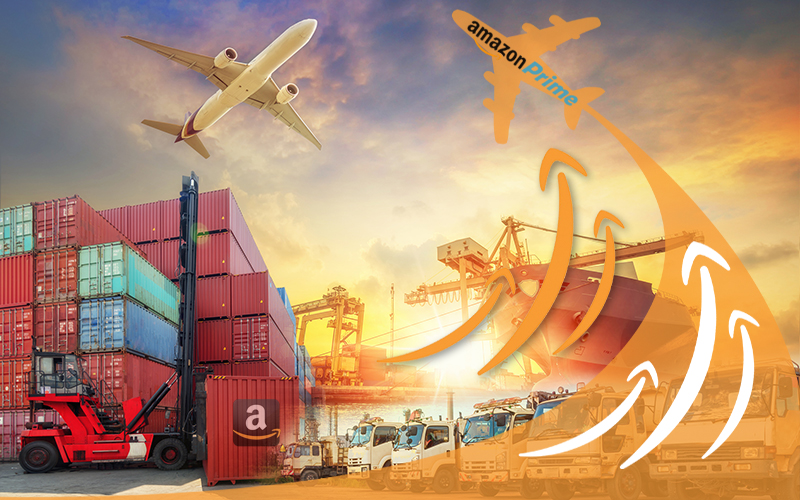Amazon doesn't want to have to rely on (and pay) third-party delivery companies. It's already taken control of lorries and planes and now it's taking control of ships, The Wall Street Journal reports.
Specifically, the Seattle-headquartered ecommerce giant has started handling the shipment of goods from Chinese retailers that sell on its platform to its vast US warehouses.
Previously it left this to global freight-transportation companies.
Since October, Amazon has helped to ship some 150 containers of goods from China to the US, according to The Wall Street Journal, which cites shipping documents collected at ports of entry.
“Amazon has integrated all those services into one basket,” said Steve Ferreira, chief executive of Ocean Audit, in the report.
He noted that, for Amazon, creating this type of shipping service will give it “a lot of strategic value.”
Shipping is a trillion dollar industry, according to MIT Technology Review.
Amazon Expands Into Ocean Freight
Move marks online retail giant’s latest step in effort to build out its delivery business
The online retail giant has begun handling shipment of goods by ocean to its U.S. warehouses from Chinese merchants selling on its site - taking on a role it previously left to global freight-transportation companies.
The move marks Amazon’s latest step in a multiyear effort to build out its delivery business. The company doesn’t own or operate ships, but is openly acting as a global freight forwarder and third-party logistics provider, categories of companies that book space on ocean vessels and truck goods between ports and warehouses.
Amazon has helped ship at least 150 containers of goods from China since October, according to shipping documents collected at ports of entry that were compiled by Ocean Audit, a company specializing in ocean-freight refund recovery for shippers.
This month, Amazon started posting rates for new services such as sorting, labeling, and trucking shipments that traditionally are handled by global freight companies. The services and rates were posted under the name of its Chinese subsidiary, Beijing Century Joyo Courier Service Co., with Distribution-Publications Inc., a widely used platform for such information.
Full story The Wall Street Journal
While Amazon doesn't actually own any ships itself, it has started reserving space on ocean vessels and acting as a global freight operator and logistics organizer.
Other freight operators include, DHL, FedEx and UPS.
Last August, Amazon unveiled its first branded cargo plane, one of 40 jetliners that will make up the company's own air-transportation network. Amazon also has its own fleet of branded delivery trucks and it is testing delivery drones in a field just outside Cambridge, U.K.
Amazon shipped over a billion items over the 2016 holiday season alone.
Amazon's China rival Alibaba recently tied up with Maersk Line, offering customers dedicated space and prices on the Danish carrier's ships.
Related: Fighting Amazon’s Supply Chain Takeover
Related 'Amazon' White Papers
Amazon’s Move into Delivery Logistics
Many industry players and experts are waiting anxiously to see what innovations Amazon will come up with next – and above all, whether Amazon will enter into delivery logistics under its own banner. Download Now!
Chasing Amazon: Building a Dynamic Warehouse Network
Most of Amazon’s competitors are feverishly playing catch-up, and if your company is among them, reassessing your supply chain design, particularly pricing and quick delivery, is a good place to start. Download Now!
Amazon: Yet Another Massive Market on the Horizon
Amazon has “powerhouse potential” in the large transportation and logistics market, dominated by global enterprises such as DHL, FedEx, and UPS. Download Now!
Home Delivery and Same-Day Delivery for Retailers
Retailers are struggling to respond to the new threat of online giants like Amazon, who are siphoning off the customers of traditional retailers, what is driving this and what can retailers do to retaliate against this threat? Download Now!
How Industrial Distributors Should Compete with AmazonSupply
Companies that recognize and respond to the shift in power to the customer are winning hearts and wallets, the key is not to get hung up on trying to save a penny. Download Now!
Global E-Commerce Logistics 2016
Regardless of who is winning the race for volumes and profits, consumers continue to spend and the e-commerce logistics market continues to grow. Download Now!
State of Online Freight Sales
While many business-to-business sales industries continue to expand sales online, the logistics industry has been slow to adopt online freight sales and booking, leaving ample space for ambitious forwarders to expand sales with new channels. Download Now!
Article topics
Email Sign Up

























